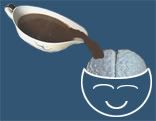Link to Interview with Nobel Laureate Peter Agre
I was reading the Eide Neurolearning Blog, and I saw an interesting link to an interview of Nobel Laureate Peter Agre.
I think it's interesting that how he describes his "D" in chemistry, non-conformism, his maturation and doing what you love. These responses come after questions 4, 5 and 6.
Go read the little exerpt from the Eide Neurolearning Blog (above), it's pretty interesting stuff.
If you enjoyed these learning tips and motivational strategies, maybe you'll enjoy the other posts. Please bookmark this page (Ctrl-D) or check out the archive/categories to the right. Better yet, tell a friend! (Click the envelope below this.)
Labels: Interviews, Mindset









5 Comments:
It's interesting that there are entire sections of departments now researching education, specific of that field of study. My department (physics) has a PhD programme entitled 'Physics Education'.
Being in biophysics, I get to see learning from the perspective of both the life-sci student and the physics/math student. Though similar in respects, approaching each in terms of studying and learning is quite different. To put it simply, bio requires you to fill your mind, whilst math/physics require you to bend and stretch it.
I don't know where this is going. I read through a lot of your material, good stuff.
-Riyaad
Heh, thanks for the compliment Riyaad.
And about your filling/bending/stretching comment, I agree. In a way, I long for the days of a critical assessment of what we are being taught, rather than a fuzzy regurgitation.
I am getting a bit of a taste for this now, but you know how Life Sciences can be.
I find we tend to shy away from the bio/life sciences that require bending and stretching of our minds. Just look at labs, where most people go directly to the textbook, scared to wrongly analyze the data they obtain. The life sciences were all originally bending and stretching, where people had to come up with novel concepts and ideas to describe the events that were happening, but they could only indirectly see.
It's really difficult to do, but those labs where you actually have to analyze the data are the most fun. The great thing is it's hard to be dead wrong. Instead, your aim is to continuously test your hypothesis until you prove it wrong. And in that case, you form a new one.
I agree Azim,
There are classes, labs, etc where I've argued that a shop keeper from China town could attend and do well in, simply because they require little original thought. I've really grown to appreciate what it means to be without that 'safety net' this year in my labs, where we're required to work alone with unfamiliar equipment guided by theory alone. I spent two and a half hours setting up an optical bench to do a photoelectric effect experiment yesterday - the lab was over half-an-hour later and I took no readings. It seems an almost trivial example, but if I have to learn complex circuitry on my own then that's what I'll do.
-Riyaad
Hey hey, let's not bad mouth Chinese shop keepers.
Along the same lines as both of you, even if something is frustrating and annoying to learn, you will always remember the lesson.
Oh, and I plan on updating tomorrow.
Post a Comment
<< Home